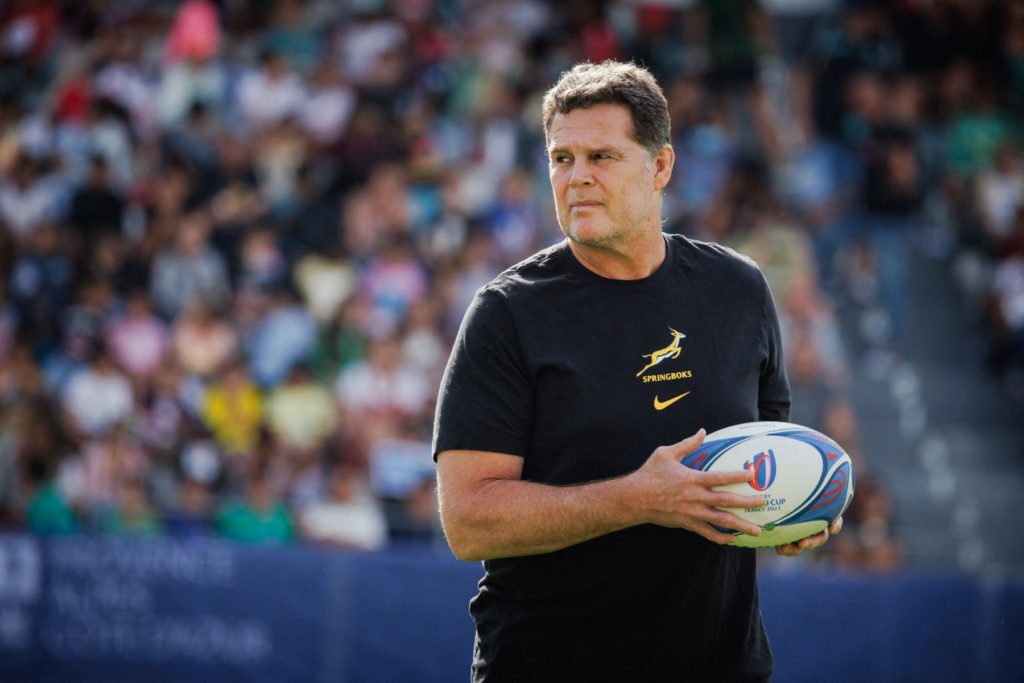The Springboks have to evolve their personnel, but not their tactical philosophy, writes RYAN VREDE.
The Boks swept to consecutive World Cup triumphs in Paris on Saturday evening. In the wake of Wayne Barnes’ full-time whistle, their players, buoyed by the result’s significance, exhibited degrees of energy they had no right to have.
These men had spent less than half the game in New Zealand’s territory, had 40% of the possession, and made 117 more tackles than the All Blacks. Many of those tackles were scrambling in nature, given that the All Blacks utterly dominated the gain line fight and beat 37 defenders.
Consider, now, that this was the statistical trend for the quarter-final and semi-final. The Boks could have been forgiven for laying prone on the Paris turf after 80 brutal minutes on Saturday. Elation elevated them then and will carry them in the days ahead. But they paid a significant physical price for the prize.
Yet, they would have it no other way. In the context of their tactical philosophy, their statistical inferiority is by design. The irony of it all is an unwavering belief in their mental, physical, and technical superiority accounts for a statistical inferiority.
Simply put, the Boks believe they can win without the ball, and often, without territorial dominance. This belief is rooted in the profile of players at their disposal. Physically, few teams can boss the Boks at the gain line. Fewer still in scrums, or at lineouts. Furthermore, they have a clutch of players who excel at contesting up-and-unders and exploiting the subsequent broken-field attacking scenario a retrieval creates. Importantly, they have more still who are conditioned to contest the breakdown, or subsequent waves of attack, should their aerial assault not result in a retrieval.
At their best, the Boks are the hardest side in world rugby to play against thanks in no small part to their devotion to what some would consider tactical pragmatism – their willingness to grind you into submission and capitalise on your errors.
I write about this because I’ve seen an ever-growing list of respected rugby personalities call for the Boks’ tactical evolution in the wake of their World Cup triumph. Most recently, I read respected rugby writer, Robert Kitson, lamenting this approach in his Guardian column.
“As the mesmerising quarter-finals proved, tries do not make great games of rugby per se but ‘get-rid’ kicking, suffocating blitz defence and huge breakdown collisions cannot be allowed to become the only logical blueprint for the world’s best sides,” Kitson wrote.
I humbly disagree. Kitson’s appraisal fails to take into account not only that director of rugby Rassie Erasmus and head coach Jacques Nienaber have meticulously identified the profile of players required for the purpose, but then maximised the mental, physical, and technical skill sets prevalent in that player pool.
Furthermore, what critics of their method don’t understand, or fully appreciate, is that its effectiveness is amplified by the fact that our tactical identity is underpinned by the best qualities of a national identity.
Resilience and perseverance in the face of unrelenting adversity, combined with the ability to creatively solve problems, is who South Africans are. Indeed, it is who these Boks are.
Their tactical identity is not a reach. It is an extension of the pre-existing qualities these men possess in measures that their counterparts simply do not, by virtue of a daily reality. Once combined with their physical gifts, technical astuteness, the experience of being in deep water in major Test matches, and a cause – evident by the consistency of the Boks’ “For our country” narrative – they are formidable.
Erasmus established a tactical blueprint that must never be abandoned. Tweaked to account for the opposition, certainly, but never abandoned.
Countless predecessors have folded under the pressure of a public outcry for an expansive style of play. Results testified to the unsuitability of such an approach.
Contrary to a prevailing belief, this philosophy does not lack the potential for ball-in-hand potency. It simply provides a framework for when to run, not a restriction on running altogether.
Nienaber’s tenure has ended, while Erasmus, despite being contracted until 2026, has been linked with various high-profile jobs. The incoming leadership team will have to evolve their personnel. Twenty of the 33-man World Cup squad are 30 or older. The vast majority of those either won’t make it to the next World Cup, or arrive in Australia as bit-part players.
Change is needed, but should not include a departure from the tactical philosophy that has banked two World Cups, a British & Irish Lions series victory, and a clutch of major Test wins.
The pathway to success has been laid. Seeking out a more scenic route there now will be terminal to our cause.
Photo: CLEMENT MAHOUDEAU/AFP





